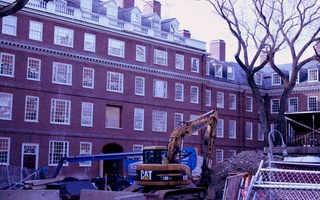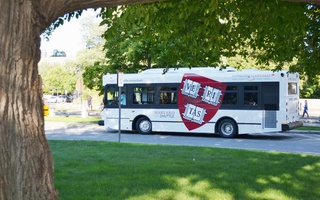In response to complaints of severe rodent infestation in Allston this February, Harvard spent roughly a quarter of a million dollars to provide North Allston residents with 2,600 rodent-resistant trash cans early last week to help alleviate the problem.
Some North Allston residents have been complaining about a rise in the rodent population, tying it to Harvard’s construction work on the still incomplete science complex.
“It’s absurd to think that blasting a massive hole in the ground isn’t going to cause a rodent problem,” said Jake Carman, a founder of the Allston Brighton Neighborhood Assembly. “The rats weren’t there before they started construction.”
And while University officials maintain that Harvard is “in no way responsible for any increased rodent activity,” the University agreed to fund the trash receptacles as “part of [its] larger partnership with the city and the neighborhood,” said Kevin A. McCluskey ’76, Harvard’s senior director of community relations for Boston.
The principal health inspector for Boston’s Inspectional Services Department, John Meaney, agreed that Harvard is not to blame.
“There would be rats in the neighborhood whether Harvard was there or not,” Meaney said.
The trash cans, distributed by the City of Boston last week, have been generally well-received in the community.
John Cusack, an Allston Brighton Task Force member and a recipient of a rodent-resistant receptacle, said that he loved the cans, calling them “a grand slam” and giving them an “A+.”
“They carry a huge amount of garbage,” Cusack said. “I can’t see any way that they could be anything but the best solution.”
But Harry Mattison, another member of the task force, said he was a bit perplexed by Harvard’s decision to finance this latest addition to the community.
“I was surprised to learn Harvard was spending probably close to a quarter of a million dollars to buy trash cans.” Mattison said. “Individual residents and homeowners should be responsible for their own trash.”
He added that this sort of involvement was “a strange direction” for the University to be pursuing, given earlier talk of providing “community benefits.”
“There was a lot of talk about education, public health—things that Harvard as an educational institution would be uniquely capable of providing,” Mattison said. “There was never discussion of free trash cans.”
—Staff writer Sofia E. Groopman can be reached at segroopm@fas.harvard.edu.
Read more in News
Doctor Promotes Medical View of TransgenderismRecommended Articles
-
Signs, Cans, Tools, Oh My!‘Stomp’ gives banging show with unconventional percussion instruments
-
Searching for the CarpinchoWith beaver-like teeth and a slight resemblance to an overgrown gopher, carpinchos are not exactly what you would call cute.
-
Rat Attack: Reports of Rodents AboundEach of the Houses has a pest control program in place, according to Leverett Building Manager Paul Hegarty. But the rat problem isn’t all in the House’s control. Many rodents spend nights scurrying around the MBTA in Harvard Station.
-
 How to Make Seniors Live in Old Quincy
How to Make Seniors Live in Old Quincy -
Harvard-Allston Task Force Debates Community Benefits PrioritiesMembers of the Harvard-Allston Task Force continued to debate their priorities for community benefits at their meeting Monday evening as part of an ongoing discussion about Harvard’s Institutional Master Plan for Allston development.
-
 Allston Residents Unhappy with Limited Shuttle Service
Allston Residents Unhappy with Limited Shuttle Service













